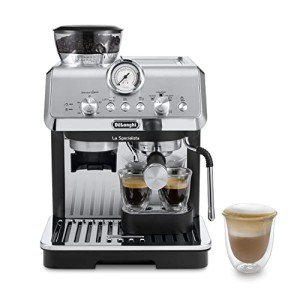The World of High-Quality Espresso Machines: A Comprehensive Guide
Espresso has become a cherished drink among coffee lovers worldwide, understood for its abundant flavor, intense fragrance, and flexibility. The heart of a terrific espresso lies in the machine used to brew it. High-quality espresso machines are created to provide the ideal shot, making them a vital investment for coffee fans. This article checks out different kinds of high-quality espresso machines, their functions, maintenance pointers, and answers to often asked questions.
Types of High-Quality Espresso Machines
High-quality espresso machines fall into numerous categories, dealing with different preferences, ability levels, and budgets. The primary types include:
| Type of Machine | Description | Perfect User |
|---|---|---|
| Manual Espresso Machines | Requires user ability to manage extraction and pressure. Provides the most control over the brewing process. | Experienced baristas and lovers |
| Semi-Automatic Machines | Combines manual operation with automation. Users manage the grind and tamping, while the machine deals with water dispersion. | Intermediate users |
| Automatic Espresso Machines | Automate the brewing process, enabling programmable brewing times and temperature levels. | Casual coffee drinkers |
| Super-Automatic Machines | Have integrated mills and are fully automated, dealing with whatever from grinding to developing and steaming. | Users looking for benefit |
| Commercial Espresso Machines | Developed for high volume use in coffee shops and restaurants, providing sturdiness and speed. | Company owner |
In-depth Overview of Each Type
Manual Espresso Machines
- Pros: Complete control over the brewing procedure; can produce exceptional quality espresso.
- Cons: Requires significant ability; lengthy.
Semi-Automatic Machines
- Pros: Balanced control, mixing manual and automatic processes; remarkable quality espresso is still possible.
- Cons: Requires some knowledge and experience to master.
Automatic Espresso Machines
- Pros: User-friendly; lowers the finding out curve while still producing high-quality espresso.
- Cons: Still requires some understanding of coffee-making basics.
Super-Automatic Machines
- Pros: Maximal benefit; little skill needed; ideal for people or families who want coffee without difficulty.
- Cons: Higher rate point; may do not have the fine-tuning capabilities of manual machines.
- Pros: Built for longevity and efficiency; typically consists of features for high-volume turns.
- Cons: Expensive; may be overkill for home use.
Key Features to Consider
When looking for a high-quality espresso machine, numerous key features ought to be considered:
- Pressure and Pump Type: Look for machines with at least 9 bars of pressure, which is necessary for extracting the best flavor from coffee beans.
- Boiler Type: Single, double, and heat exchanger boilers each impact how the machine carries out and the speed of developing.
- Develop Quality: High-quality products such as stainless-steel are preferable for durability and aesthetic appeals.
- Reduce of Use and Cleaning: Some machines need extensive cleaning, while others are developed for simple maintenance.
- Temperature level Control: Consistent temperature is vital; think about machines with PID controllers for accurate control.
Benefits of High-Quality Espresso Machines
Investing in a high-quality espresso machine uses a multitude of advantages:
- Superior Quality: High-end machines permit for higher control, resulting in tastier espresso.
- Durability: Built to last, quality machines require fewer repair work and replacements.
- Customization: Users can take pleasure in a tailored experience by adjusting grind size, shot timing, and other settings.
- Increased Convenience: Automatic and super-automatic options permit fanatics to delight in espresso with minimal effort.
Maintenance and Care for High-Quality Espresso Machines
To keep an espresso machine working efficiently, regular maintenance is crucial. Here are tips for keeping a high-quality espresso machine:
Descale Regularly:
- Use a descaling service every couple of months to avoid accumulation of minerals from water, which can impact taste and efficiency.
Clean the Brew Group:
- For machines with a detachable brew group, tidy it routinely to ensure a clean extraction.
Change Water Filters:
- Use a water filter and change it as required to lessen pollutants in your brewing water.
Daily Cleanings:
- Rinse the portafilter and group head after each use to prevent oil accumulation.
Keep an Eye on the Parts:
- Monitor seals, gaskets, and other parts for wear and tear and replace them as required.
Often Asked Questions (FAQs)
1. What is the best espresso machine for novices?
For newbies, a semi-automatic machine typically supplies a good balance of use and control, permitting users to learn the skills required for making terrific espresso.
2. Are super-automatic machines worth the financial investment?
Yes, for those who focus on convenience and ease over control, super-automatic machines can be a worthy investment, specifically for families or busy professionals.
3. Just how much should I expect to invest in a high-quality espresso machine?
High-quality espresso machines vary considerably in rate, with manual machines starting at a few hundred dollars, while super-automatic or commercial machines can go beyond a number of thousand.
4. Can I make other coffee drinks with an espresso machine?
Yes, many espresso machines have steam wands or attachments that permit users to develop lattes, coffees, and more.
5. The length of time do espresso machines generally last?
With correct upkeep, high-quality espresso machines can last over a decade, making them a long-lasting financial investment in your coffee enjoyment.
High-quality espresso machines yield a transformative coffee experience, whether delighted in in your home or in a commercial setting. By understanding the types readily available, their functions, and the maintenance required to keep them running efficiently, consumers can make educated choices that raise their coffee-drinking experience.

